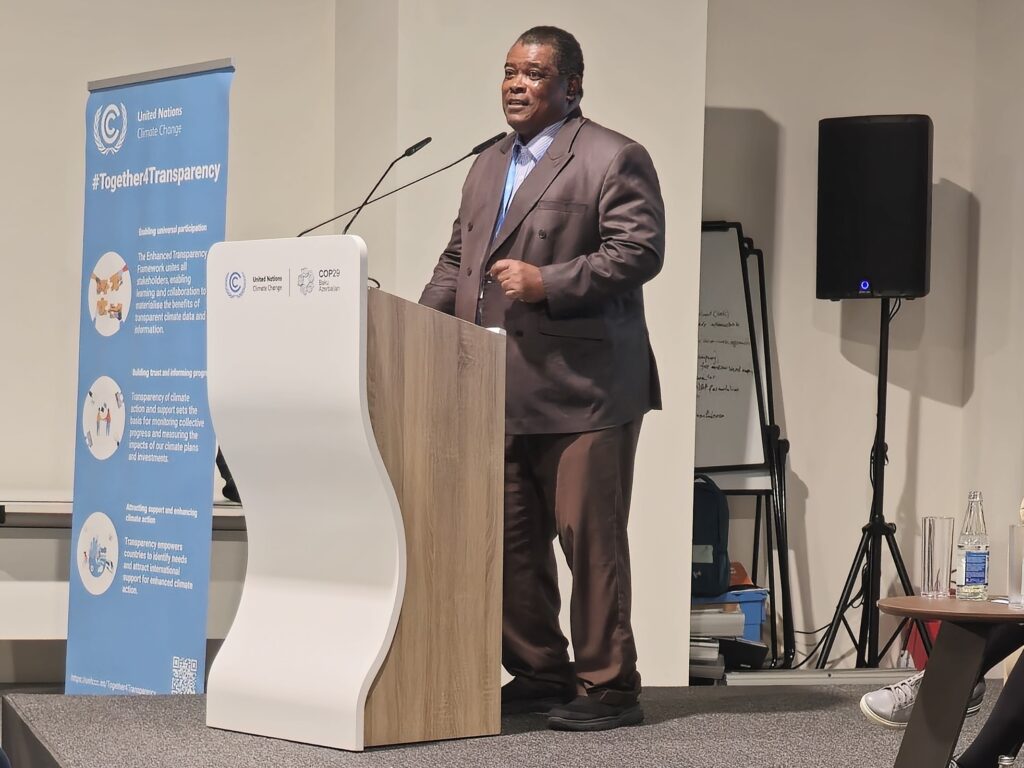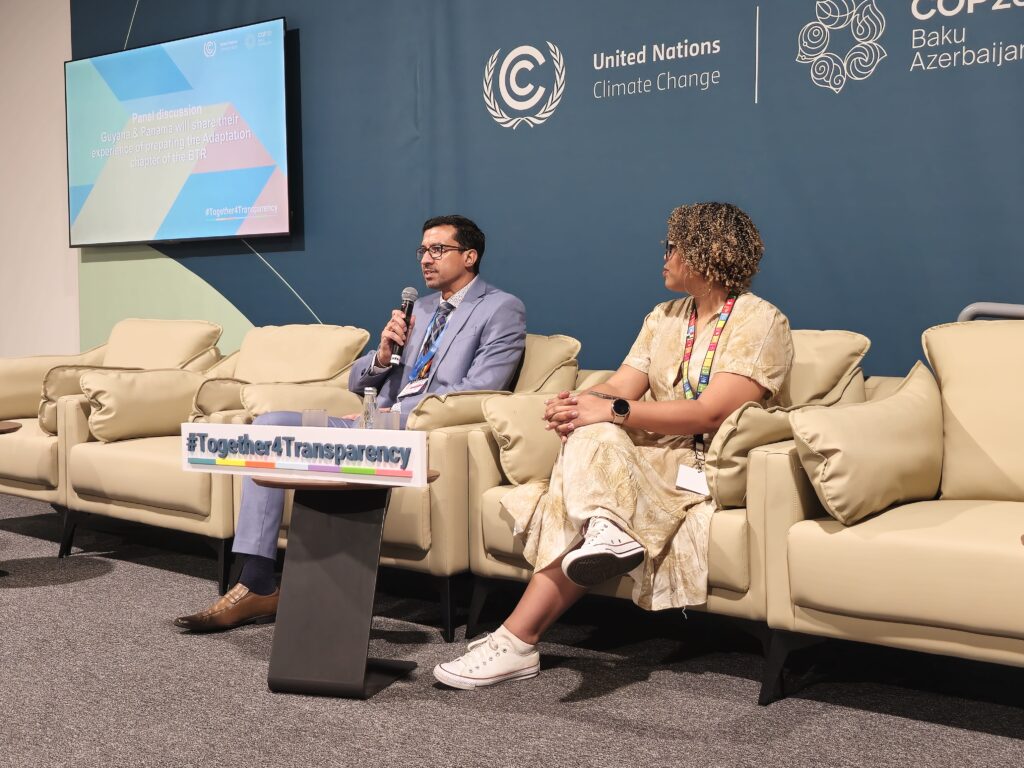By Danielle Swain in Baku, Azerbaijan
At the ongoing UN climate conference in Baku, Azerbaijan, Guyana has been encouraging the preparation and training of local expertise to assess and report on key deliverables required by the United Nations Framework Convention on Climate Change (UNFCCC).
In particular, Guyana participated in a pre-launch event for the Adaptation Technical Expert Review (TER) training.
Nickolaus Oudkerk, from the Department of Environment and Climate Change (DECC), Office of the President shared Guyana’s experiences alongside Panama, Kenya and Egypt during a panel discussion focused on preparing the adaptation chapter of their Biennial Transparency Report (BTR).
The event aimed to introduce a new training course for expert reviewers assessing adaptation information reporting by countries, as part of efforts to strengthen global climate resilience.
Enhancing Adaptation Efforts in Developing Nations
Donald Cooper, Director of the UNFCCC Transparency Division, opened the event by emphasizing the critical role adaptation plays in developing nations, praising Guyana’s efforts.
“The most impressive thing I took from participating as an observer in the review of Guyana’s BTR is how much they owned it,” Director Cooper remarked. “It was theirs. They prepared it, they knew everything that was in it, and they defended it, explained it, and convinced everybody about why they went that way.

“In other words, a consultant didn’t come in, fill out a form, and change the name from Jamaica to Guyana.”
He continued, “I was pleasantly surprised. You’re talking to the chief civil servant responsible for that particular area, and he knew more about Adaptation, Forestry, Blue CF than I did. So, the ownership and understanding is phenomenal. It comes from preparing their BTRs, leading to their new Nationally Determined Contributions (NDCs), so the process is extra ordinally valuable.”
Panama and Guyana: Navigating Challenges
Mabel Zuñiga Quintero, from Panama, highlighted the nation’s commitment to including adaptation in its BTR despite not having a finalised National Adaptation Plan (NAP).
“We took everything we had on adaptation to build a structure that actually works,” she said. Quintero emphasized the importance of local ownership and capacity-building, stating that their BTR was developed with local consultants and government officials.

Oudkerk, highlighted Guyana’s vulnerability to climate change impacts, particularly flooding.
“Adaptation is survival for us,” he stated. With most of the population residing along a low-lying coastline, Guyana faces significant risks from sea-level rise and extreme weather events.
“In 2005, when we had our worst flood, we incurred damages that were equivalent to 60% of our country’s GDP and that affected hundreds of thousands of persons,” Oudkerk recounted. In a nation with a population of just around 750,000, such events underscore the critical importance of implementing effective adaptation measures.
Building on Existing Strategies
Guyana has several national strategies to address climate challenges. The country’s Low Carbon Development Strategy, first launched in 2009 and updated in 2013 and 2021, serves as a cornerstone for its adaptation efforts. Additionally, the Climate Resilience Strategy and Action Plan provides a framework for assessing risks and identifying necessary actions across various sectors.
“We looked at our current scenario, looking at our climate vulnerability profile, looking at the importance economically and looking at the kind of risks associated across all sectors,” Oudkerk explained. Further sharing that by identifying those risks, Guyana could determine the necessary adaptation actions and the agencies responsible for implementing them.
Creating a National Adaptation Database
One significant outcome of Guyana’s adaptation reporting process is the development of a comprehensive national adaptation database.
Oudkerk noted that previously, Guyana had lists of projects and activities, but the database allowed for better coordination between entities, reducing redundancies.
The database aids in tracking progress towards the country’s Nationally Determined Contributions (NDCs) and enhances transparency for potential international support.
Start with what you have: Challenges and Lessons Learned
Guyana, like other developing nations, faced many obstacles in preparing their BTR but Oudkerk encouraged other countries to begin their adaptation reporting, even if all the answers aren’t immediately available.
“You don’t have to be perfect,” Oudkerk advised. “Start with what you have, use existing documents and knowledge, and build upon it.”
Despite progress, Guyana faced challenges in data collection and capacity building. Coordinating information across various ministries, private sectors, civil society, and indigenous communities required significant effort.
The pre-launch event, organized by the UNFCCC secretariat with support from the Woodwell Climate Research Center, aimed to strengthen the global network of experts reviewing adaptation efforts. With an anticipated increase in BTR submissions, the need for trained reviewers is more critical than ever.
Guyana’s approach to climate adaptation underscores the critical importance of national ownership and capacity building in environmental initiatives.
By sharing its journey, Guyana hopes to inspire other nations to prioritize adaptation in their climate strategies.
The post At UN Climate Summit, Guyana hailed for ownership of national climate plans appeared first on News Room Guyana.